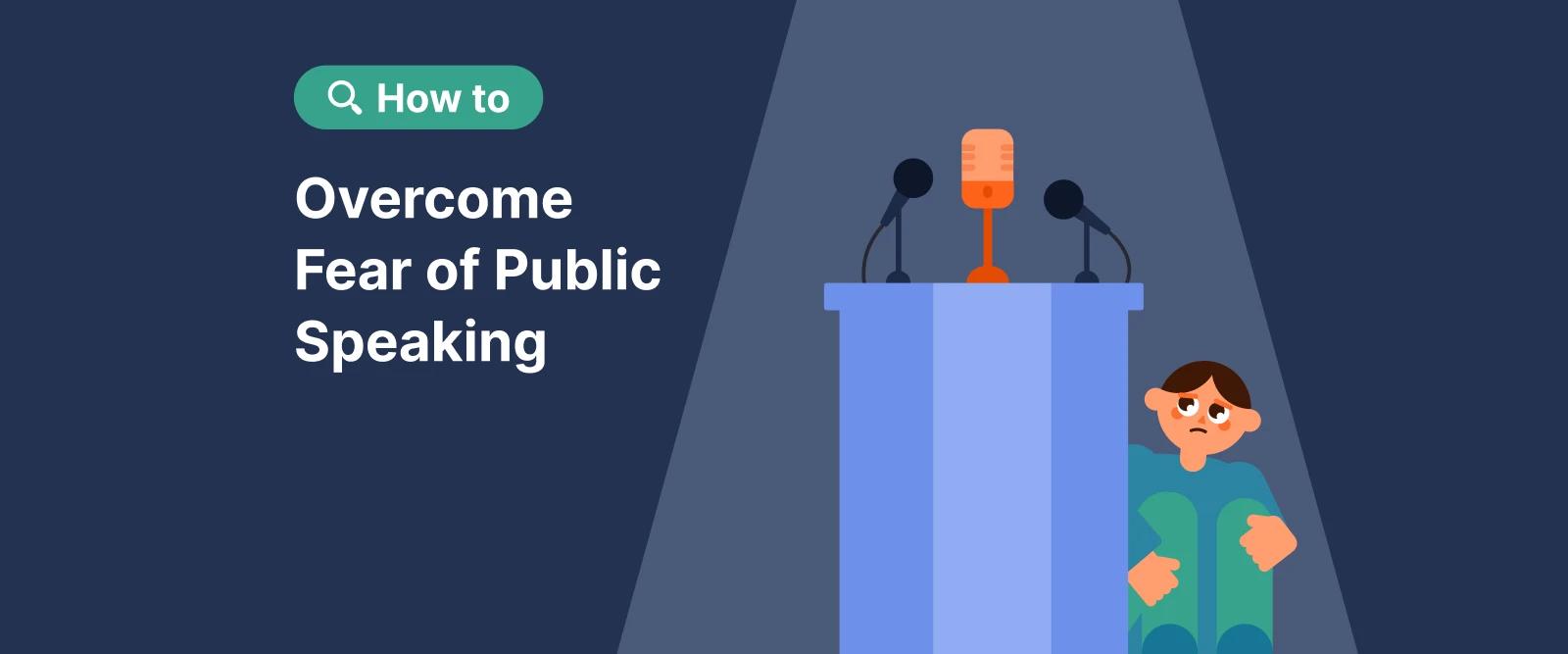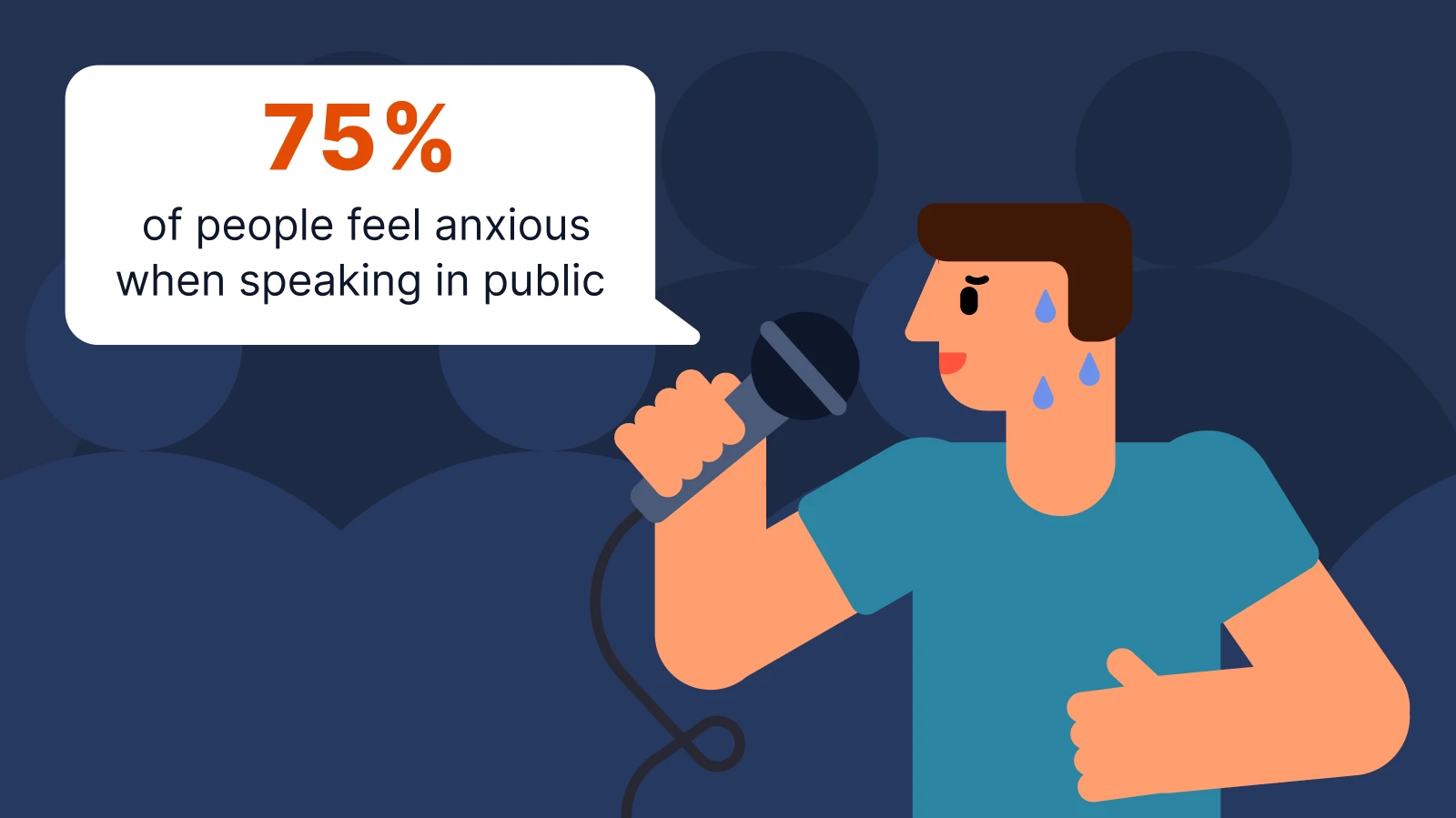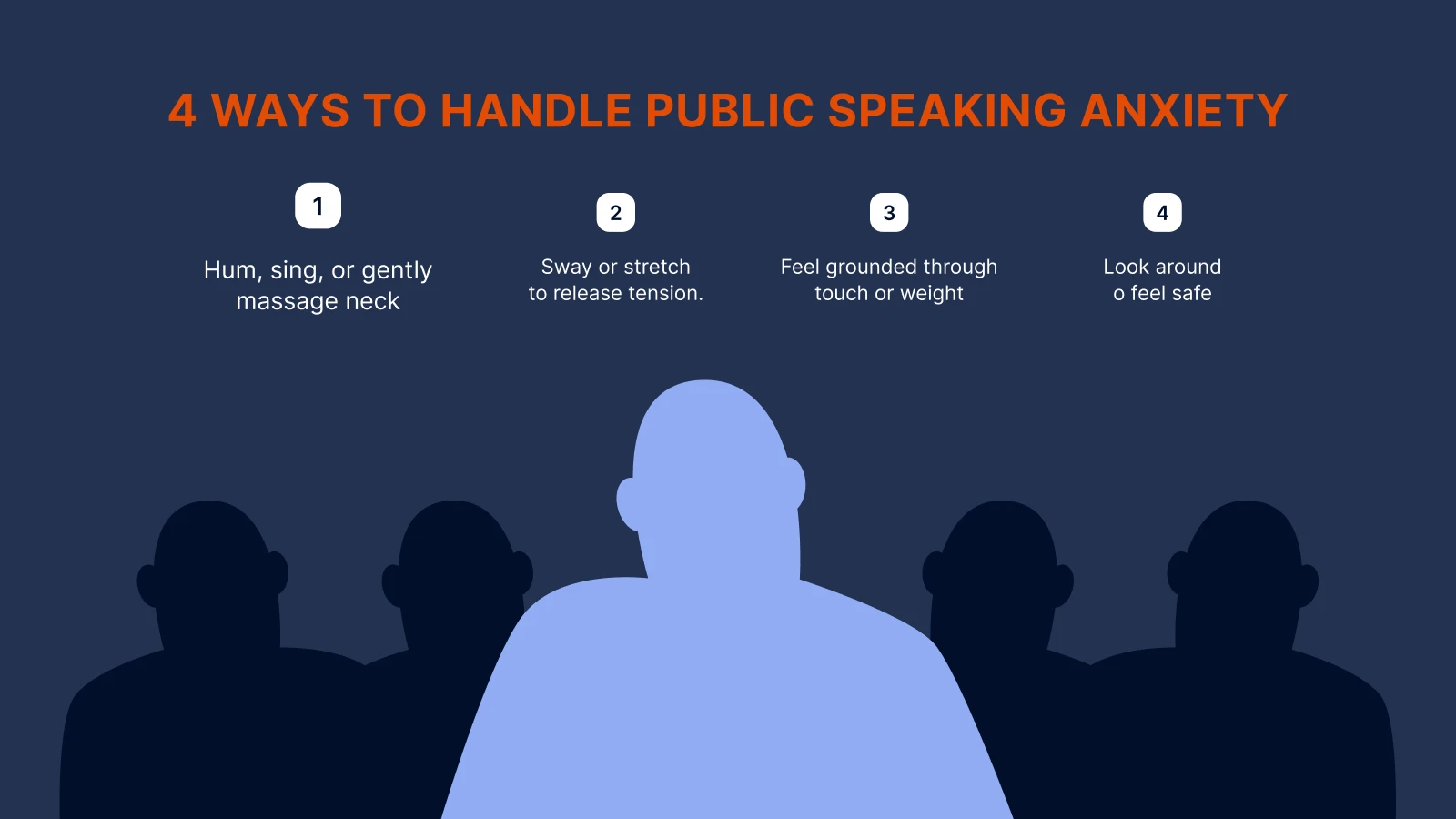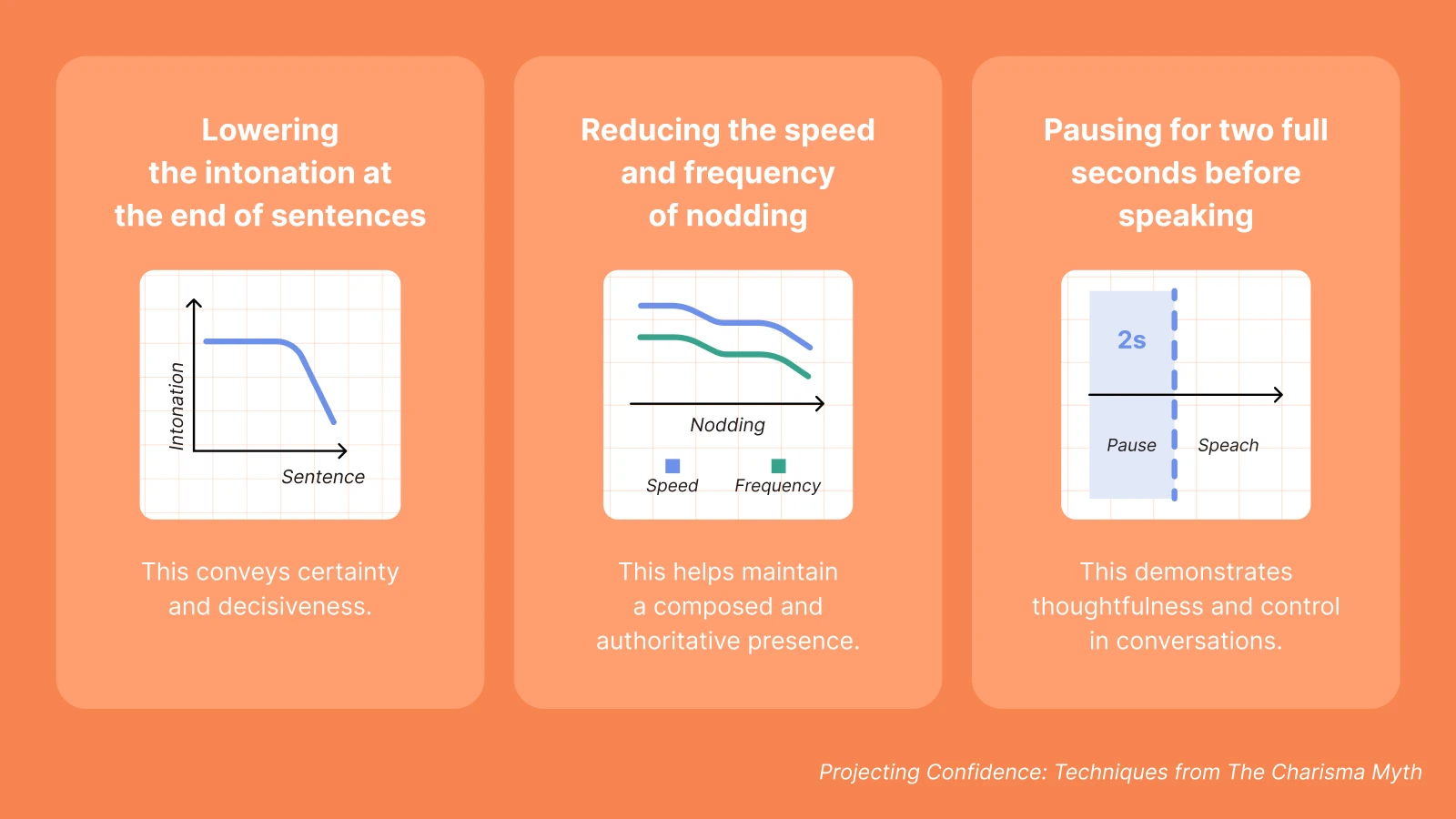As a trauma educator and somatic practitioner, I’ve seen how the fear of public speaking—experienced by up to 75% of people—can deeply affect both the body and mind, becoming a real barrier to personal and professional growth. According to the University of Florida, this common fear, known as glossophobia, is one of humanity's greatest anxieties.
As Trey Gowdy explains in 'Doesn't Hurt to Ask,' effective communication is about confidence and curiosity — two elements that can completely transform your approach to public speaking.
Glossophobia is more than a case of nerves. It's a genuine physiological and psychological response to speaking in front of others. Most people fear being judged, making mistakes, or reliving past embarrassing moments.
In 'The Charisma Myth,' Olivia Fox Cabane explains how most of this fear exists in your head. You are often your worst critic, which makes you treat and judge yourself more harshly than others. So, if you feel anxious, here's a neat trick to try out: reframe your fear as excitement and see how things begin to shift.
How your body reacts (Spoiler: The same as in case of physical danger)
To your nervous system, being a public speaker is mentally no different than being in physical danger. Your heart races, your hands tremble, and your breathing becomes shallow. This response is natural, but you can learn to master it.
In 'Crucial Conversations,' Kerry Patterson emphasizes the power of staying calm under pressure. Understanding the mechanisms behind your body's stress response and learning to regulate your nervous system can help you navigate stage fright with greater ease and confidence.
The nervous system and public speaking anxiety
Public speaking anxiety is not only mental but also inherently tied to how your body, specifically your nervous system, responds. When speaking in front of people, your brain often interprets the situation as dangerous, triggering your sympathetic nervous system and causing physical symptoms like a pounding heart, tense muscles, and sweaty hands.
To counter this, you can learn to activate the parasympathetic nervous system, which promotes relaxation. Here's how:
Vagal nerve stimulation: Humming, singing, or gently massaging the sides of your neck can help shift your nervous system from fight-or-flight.
Orienting: Instead of concentrating on your fear, look around the room. Taking in your surroundings helps your body recognize that you're safe.
Grounding techniques: Press your feet firmly onto the floor, hold a comforting physical object, or consciously feel the weight of your body in the chair to anchor yourself.
Gentle movement: Rocking, stretching, or swaying side to side before speaking to a large audience is a great way to release some activated sympathetic energy.
How to feel more confident when speaking to an audience
Self-confidence is also more than a state of mind — it's a state of physiology. Research suggests that specific practices like power poses, deep and slow breathing, and visualization can help reset the brain's perception of public speaking as something to embrace rather than dread.
Cabane notes that even small shifts in your body language affect how you feel and present yourself to the world. Adopting a power pose like standing tall with your shoulders back can decrease cortisol (the stress hormone) and increase testosterone (the confidence hormone) levels, helping you feel more in control before you step on stage.
Remember to choose natural and comfortable poses while keeping your feet steady and grounded.
Why is public speaking such a scary experience?
Fear of judgment
Anyone who cares what others think struggles with this fear, whether you are doing it for the first time or the hundredth. So, pretty much, all of us. Here's where self-talk comes in. As Gowdy explains, "Reframe the negative thought — the worst that can happen is you don't get the answer you want, but if you don't ask, you won't get any answer at all."
It's the same with public speaking. You'll never know how well you'll do if you never take the stage. Without practice and speaking opportunities, you will not improve.
Past negative experiences
If you've had bad experiences with public performance, like freezing up during a PowerPoint presentation, forgetting your words, facing mockery, or feeling embarrassed, those memories will likely create anxiety.
'Crucial Conversations' recommends rebuilding confidence by practicing dialogue in safe environments. Begin with less intimidating speaking settings, such as in front of a mirror or a family member. These exercises will help your nervous system gradually build tolerance for the discomfort of public speaking.
If you believe you've had traumatic experiences in the past, you battle with speech anxiety or panic attacks on stage, consider working with a trauma-informed therapist or another professional who can help address these concerns.
Perfectionism
Most speakers self-sabotage by pressuring themselves to be perfect. But as Cabane points out in 'The Charisma Myth,' genuine charisma is created by a relaxed presence, not flawless execution.
So, the next time you feel the urge for perfection, choose authenticity. Honest, engaging speakers connect more deeply with their audiences because they're relatable and human.
How body language affects public speaking
While the words you choose are essential, body language registers equally, if not more so. Cabane highlights that relaxed facial expressions, good eye contact, and purposeful hand movement convey confidence, even when feeling nervous.
Regularly practicing strong body language in everyday conversations makes it feel more natural when you're on stage. Plus, developing bodily awareness can help you feel genuinely connected and authentic in your body language. Try practicing this centering exercise:
Find your ground
Sit or stand with your feet firmly planted on the ground.
If sitting, feel the connection of your sit bones with the surface beneath you.
Soften your body
Relax your belly area — allow it to be soft and natural.
Drop your shoulders — let them move away from your ears.
Release tension in your jaw — let it rest comfortably.
Gaze & breath
Keep your eyes open with a soft gaze toward the horizon.
Allow your breath to flow naturally without forcing or controlling it.
Rest in awareness
Notice the subtle shifts happening in your body.
Stay with this presence, grounded and open.
Do this practice as often as you remember until it becomes second nature. It will make you more embodied as a speaker and also work as a stress reliever. Eventually, you'll be able to feel and present yourself better.
Add to your arsenal of public speaking tools
The power of storytelling
A compelling story can hook an audience and make your message more memorable. Gowdy explains that storytelling is one of the most effective ways to connect with your listeners. When revising your presentations, look for opportunities to make them less formal and more engaging.
Managing challenging situations when you're on stage
Even seasoned speakers sometimes have moments outside their control — technical problems, memory lapses, or unresponsive audiences. 'Crucial Conversations' suggests keeping your cool and improvising with confidence when plans flop.
Instead of panicking, pause, take a few deep breaths, and reframe the moment as an opportunity to connect with your audience. Your ability to address unexpected situations with grace can increase your credibility.
The importance of vocal variety
Even the most interesting speech can sound dull when delivered in a monotone voice. Learning to vary your pitch, tone, and pacing helps emphasize different points and captivate your audience.
'The Charisma Myth' recommends tricks like lowering your voice for dramatic effect and pausing strategically to create anticipation to make your speech more compelling. Practice and have fun with it!
Using social media to enhance Public speaking skills
Social media platforms like LinkedIn offer a lower-pressure environment where you can develop your speaking skills. Film yourself and review the footage; the tapes will reveal what you could improve on.
Gowdy emphasizes that communication is a skill. Since social media offers a platform to develop messages, receive feedback, and increase confidence before stepping onto a bigger stage, why not make the most of it?
Releasing tension in the body before speaking
Many speakers experience muscle tension before presenting. If the centering exercise described earlier doesn't fully relax you, it likely means a lot of stress and activity is in your nervous system. In such cases, more dynamic tools are required to work with that energy.
A good way to release this is through progressive muscle relaxation (PMR), a technique where you tighten and then release different muscle groups. This technique is often used in somatic therapy to relax the body and enhance presence before facing an audience.
Here is how to do it:
1. Find a quiet spot
Stand or sit comfortably with your feet firmly grounded.
Take a deep breath in through your nose and exhale slowly.
2. Tense & release each muscle group (5 seconds tension, 10 seconds relaxation)
Hands & Arms: Clench your fists tightly, then release.
Shoulders: Shrug up to your ears, hold, then drop them.
Face & Jaw: Scrunch your face, tighten your jaw, then relax.
Chest & Back: Take a deep breath, expand your chest, then exhale.
Legs & Feet: Press your feet into the ground, squeeze your thighs, then relax.
3. Full-body scan
Take one deep breath.
Notice any remaining tension in your body.
Consciously release it fully.
4. Grounding breath (box breathing)
Inhale for 4 seconds.
Hold for 4 seconds.
Exhale for 4 seconds.
Hold for 4 seconds.
Repeat 3 times.
This quick PMR resets your nervous system, helping you feel relaxed yet focused before stepping on stage.
Key takeaways: How to overcome the fear of speaking in front of an audience
To sum it up:
Overcoming the fear of public speaking is a journey, not an overnight transformation. What you need to develop this skill is practice and the right strategies. The key insights from 'Doesn't Hurt to Ask,' 'The Charisma Myth,' and 'Crucial Conversations' highlight that:
Confidence is built, not inherited — Even the best speakers started somewhere. Practicing consistently is the key to improving.
Public speaking is about connection, not perfection — Audiences respond more positively to authenticity than polished but robotic delivery.
Calmness under pressure can be trained — With practice, you can teach yourself to regulate your nervous system and remain composed while speaking.
Effective strategies for becoming a confident speaker with Headway's summaries
1. Shift your mindset:
Reframe fear as excitement (as suggested in 'The Charisma Myth').
View speaking as an opportunity to share, not a test of perfection.
Accept that some nerves are normal and even beneficial.
2. Use body & breath to your advantage:
Practice grounding exercises before speaking.
Utilize power poses to boost confidence 'The Charisma Myth').
Control your breath with techniques like box breathing to regulate anxiety.
3. Master the art of connection:
Engage your audience with storytelling ('Doesn't Hurt to Ask').
Maintain eye contact and use purposeful gestures.
Speak as if you're having a conversation, not performing.
4. Develop practical speaking skills:
Record yourself and analyze your delivery.
Use vocal variety — adjust tone, pitch, and pacing ('The Charisma Myth').
Start small by practicing in front of a mirror, with friends, or on social media.
5. Prepare for challenges:
Expect things to go wrong sometimes — embrace improvisation ('Crucial Conversations').
If you lose your train of thought, pause, breathe, and continue.
Have a backup plan for technical issues or unexpected disruptions.
Good public speaking isn't about delivering a flawless script; it's about engaging your audience in a natural and impactful way. Instead of focusing on eliminating nervousness, focus on using it as energy to enhance your presence.
Take a deep breath, step up, and speak confidently!
Frequently asked questions on how to overcome fear of public speaking
How to not be nervous when talking to someone?
It’s common to feel nervous in everyday conversations, especially if you’re an introvert or struggle with social anxiety. The fear often comes from worrying you’ll say the wrong thing or be judged. A great way to ease this is to shift focus from what you’ll say to simply listening well. Slow down, breathe deeply, and engage with eye contact and nods.
How to talk confidently?
To build confidence, try a Toastmasters meeting or a public speaking class, where you can practice in a low-pressure environment. Even listening to a podcast about communication skills can help you develop small, actionable habits to feel more relaxed. Remember, casual conversation is a skill — and like any skill, it improves with repetition and reflection.
Why am I scared to talk to people in public?
Being scared to talk to people in public often stems from social anxiety, fear of rejection, or past negative interactions. Your brain might interpret social situations as risky, triggering a stress response. This is completely normal. Start small — say "hi" to a cashier, ask for directions, or make brief comments in public settings. Gradual exposure helps your brain realize these moments are not dangerous.
What are 5 ways you can overcome a fear?
Gradual exposure — face fears in small, manageable steps.
Challenge negative thoughts with realistic alternatives.
Practice relaxation techniques like deep breathing.
Seek support from friends, family, or therapists.
Focus on past successes to build confidence. Consistency matters more than speed when confronting fears.
Does public speaking anxiety ever go away?
Public speaking anxiety can significantly decrease with practice, but may never completely disappear—and that's normal. Even experienced speakers feel some nervousness. The key is learning to manage anxiety rather than eliminate it. With repeated exposure and preparation, you'll develop confidence and the nervousness becomes less intrusive and more manageable.
What are the 7 characteristics of a good speaker?
Good speakers demonstrate: Confidence (strong presence and self-assurance), Clarity (easy-to-understand message), Passion (genuine enthusiasm for their topic), Authenticity (natural, relatable delivery), Preparation (thorough knowledge and practice), Engagement (connection with audience), and Adaptability (responsiveness to audience reactions).











